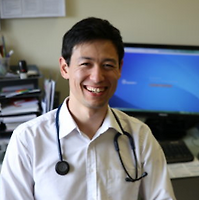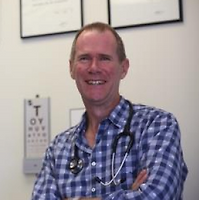Central Auckland > GPs / Accident & Urgent Medical Care > ProCare >
GP Central - Stoddard
General Practice (GP) Service
Today
8:00 AM to 6:00 PM.
Description
Our patients are able to book appointments at both of our two locations.
- GP Central - Stoddard
- GP Central - Dominion
In 2023, Stoddard Road Medical Centre transformed to become GP Central - Stoddard. Our new identity reflects our progressive approach to healthcare, while retaining our core values. It’s the same great healthcare, by the same trusted people. The clinic is still 100% owned and operated by the doctors who work here.
In 2024 we expanded by opening a 2nd clinic on 969 Dominion Road, GP Central - Dominion. This allows us to better serve our growing community.
Visit our website for more information on booking appointments, ordering prescriptions, our online patient portal, and enrolling with us.
Staff
Visit our website to Meet the Team
www.gpcentral.co.nz/meet-the-team
Doctors
-

Dr Samuel Burridge
General Practitioner
-

Dr Caitlin Corlett
General Practitioner
-

Dr Calum Cunningham
General Practitioner
-

Dr Benjamin Liu
General Practitioner - Vocationally Registered
-

Dr Richard Lowe
General Practitioner - Vocationally Registered
-

Dr Gary MacLachlan
General Practitioner - Vocationally Registered
-

Dr Iain MacLean
General Practitioner - Vocationally Registered
-

Dr Queenie Son
General Practitioner - Vocationally Registered
-

Dr Logitha Sritharan
General Practitioner
-

Dr Oonagh Turner
General Practitioner - Vocationally Registered
How do I access this service?
Contact us
Phone: (09) 621 0387
Email: kiaora@gpcentral.co.nz
Website / App
Our friendly receptionists can help you to sign up.
Home visit provider
We are proud to offer Home Visits to our local community, but please discuss it with your doctor first. This will ensure that it is the most appropriate option for your situation. Please keep in mind that scheduling a Home Visit requires sufficient prior notice to accommodate it in the doctor’s schedule. We do charge additional fees for home visits.
Enrolling new patients
Yes
This practice is enrolling new patients.
Please visit our website or contact us to find which GPs are accepting new patients.
Dr Ben Liu is not accepting new patients.
Fees
Enrolled Patient Fees
| Under 14 years | Free |
|---|---|
| 14-17 years | $13.00 |
| 18-24 years | $19.50 |
| 25-44 years | $19.50 |
| 45-64 years | $19.50 |
| 65+ years | $19.50 |
As a “high needs” clinic (VLCA - Very Low Cost Access), we have access to additional government funding, allowing us to provide a wider range of subsidised, and often free, services. We are proud to be able to offer quality healthcare that is accessible to all, regardless of financial circumstances.
The fees above are for standard consultations for patients who are both enrolled and funded.
An after-hours surcharge applies on Saturdays.
For more information about our fees, please visit our website.
Hours
8:00 AM to 6:00 PM.
| Mon – Fri | 8:00 AM – 6:00 PM |
|---|---|
| Sat | 8:30 AM – 1:00 PM |
Note: Our Saturday Clinic is walk-in for registered patients only.
An after-hours surcharge applies on Saturdays. For more information about our fees, click here.
We are closed on public holidays.
We are closed on the Saturdays of Easter, Christmas and New Year weekends.
We are closed on Saturdays preceded by a Friday public holiday. (e.g. Matariki)
For help after-hours try Care HQ – they are our trusted partners, providing online consultations with a qualified New Zealand doctor. They are available 7 days a week, 7am‑9pm.
or Healthline – 24/7 free advice (nationwide government telehealth service). Phone: 0800 611 116
Public Holidays: Closed ANZAC Day (25 Apr), King's Birthday (3 Jun), Matariki (28 Jun), Labour Day (28 Oct), Auckland Anniversary (27 Jan), Waitangi Day (6 Feb), Good Friday (18 Apr), Easter Sunday (20 Apr), Easter Monday (21 Apr).
Preferred urgent care clinic out of hours: Three Kings Accident & Medical.
Languages Spoken
Cantonese Chinese, Chinese, English, Mandarin Chinese, Hindi, Kannada, Tamil, Telugu, Korean, Dari (Afghan Persian), Pashto/Afghani
Services Provided
Immunisation is the safest and most effective way to provide protection for you and your tamariki’s health. For more information view the NZ immunisation schedule.
Immunisation is the safest and most effective way to provide protection for you and your tamariki’s health. For more information view the NZ immunisation schedule.
- Pregnancy vaccinations
- Childhood immunisation programme
- 45 year old vaccinations
- 65 year old vaccinations
- Adult flu vaccine
- Child flu vaccine
- Diphtheria / Tetanus / Pertussis (whooping cough) vaccine
- Human Papillomavirus (HPV) vaccine
- Measles / Mumps / Rubella (MMR) vaccine
- Meningococcal vaccine
- Shingles vaccine
- Travel vaccinations
- Catch-up missed vaccinations
Immunisation is the safest and most effective way to provide protection for you and your tamariki’s health. For more information view the NZ immunisation schedule.
Your GP's surgery is far more than a place to go when you are feeling unwell and needing a quick cure. The doctor who sees you has gone through an extensive medical training to equip her or him to help children and adults of all ages with a range of physical and emotional difficulties. GPs are at the centre of the healthcare hub and will be aware of services and expertise that are available locally and further-a-field. GPs are also aware of the link that stress and unhappy life events have on physical health so know when to suggest a talking therapy rather than medication.
Your GP's surgery is far more than a place to go when you are feeling unwell and needing a quick cure. The doctor who sees you has gone through an extensive medical training to equip her or him to help children and adults of all ages with a range of physical and emotional difficulties. GPs are at the centre of the healthcare hub and will be aware of services and expertise that are available locally and further-a-field. GPs are also aware of the link that stress and unhappy life events have on physical health so know when to suggest a talking therapy rather than medication.
Your GP's surgery is far more than a place to go when you are feeling unwell and needing a quick cure. The doctor who sees you has gone through an extensive medical training to equip her or him to help children and adults of all ages with a range of physical and emotional difficulties. GPs are at the centre of the healthcare hub and will be aware of services and expertise that are available locally and further-a-field. GPs are also aware of the link that stress and unhappy life events have on physical health so know when to suggest a talking therapy rather than medication.
Getting a COVID-19 vaccine is an important step you can take to protect yourself, your kaumātua and whānau from the effects of the virus. For more information on the COVID-19 vaccines and eligibility visit Ministry of Health - COVID-19 vaccines Covid-19 vaccines can be administered before, after, or at the same time as other national schedule vaccines. When the Nuvaxovid vaccine is given at the same time as the Shingrix shingles vaccine or the Fluad Quad flu vaccine, there may be a chance of experiencing a stronger post-vaccination response and you should discuss this with your vaccinator.
Getting a COVID-19 vaccine is an important step you can take to protect yourself, your kaumātua and whānau from the effects of the virus. For more information on the COVID-19 vaccines and eligibility visit Ministry of Health - COVID-19 vaccines Covid-19 vaccines can be administered before, after, or at the same time as other national schedule vaccines. When the Nuvaxovid vaccine is given at the same time as the Shingrix shingles vaccine or the Fluad Quad flu vaccine, there may be a chance of experiencing a stronger post-vaccination response and you should discuss this with your vaccinator.
Getting a COVID-19 vaccine is an important step you can take to protect yourself, your kaumātua and whānau from the effects of the virus. For more information on the COVID-19 vaccines and eligibility visit Ministry of Health - COVID-19 vaccines
Covid-19 vaccines can be administered before, after, or at the same time as other national schedule vaccines. When the Nuvaxovid vaccine is given at the same time as the Shingrix shingles vaccine or the Fluad Quad flu vaccine, there may be a chance of experiencing a stronger post-vaccination response and you should discuss this with your vaccinator.
A patient portal is a secure online tool provided by GP practices that can allow convenient access to your health information as well as interaction with the practice e.g. booking appointments and requesting repeat prescriptions. For more information about our patient portal, visit our website.
A patient portal is a secure online tool provided by GP practices that can allow convenient access to your health information as well as interaction with the practice e.g. booking appointments and requesting repeat prescriptions. For more information about our patient portal, visit our website.
A patient portal is a secure online tool provided by GP practices that can allow convenient access to your health information as well as interaction with the practice e.g. booking appointments and requesting repeat prescriptions.
For more information about our patient portal, visit our website.
Each GP surgery or primary care practice will have its own procedure for repeat prescribing but the following rules are common to most, if not all. Patients who are well-known to the practice who have a stable condition like asthma, hypertension or diabetes could be allowed to get a repeat prescription for up to six months. Repeat prescriptions are never given to patients who are not known to the practice and there is probably a blanket ban on repeats for narcotics and other drugs that could be misused as doctors are expected to monitor these drugs carefully. Our doctors can send your e-prescription online to any pharmacy in New Zealand. Alternatively, you’re welcome to collect a paper prescription from reception. Either way, we’ll let you know once it’s all done. Please allow 24-48 hours for our doctors to arrange your prescription. Your GP may ask you to book an appointment if it’s been over 3-6 months since your last check-up. We’ll let you know, and we’ll make sure you don’t run out of medication in the meantime. Please be aware that we require 24 hours notice for repeat medications to be actioned. For more information about ordering a prescription, visit our website.
Each GP surgery or primary care practice will have its own procedure for repeat prescribing but the following rules are common to most, if not all. Patients who are well-known to the practice who have a stable condition like asthma, hypertension or diabetes could be allowed to get a repeat prescription for up to six months. Repeat prescriptions are never given to patients who are not known to the practice and there is probably a blanket ban on repeats for narcotics and other drugs that could be misused as doctors are expected to monitor these drugs carefully. Our doctors can send your e-prescription online to any pharmacy in New Zealand. Alternatively, you’re welcome to collect a paper prescription from reception. Either way, we’ll let you know once it’s all done. Please allow 24-48 hours for our doctors to arrange your prescription. Your GP may ask you to book an appointment if it’s been over 3-6 months since your last check-up. We’ll let you know, and we’ll make sure you don’t run out of medication in the meantime. Please be aware that we require 24 hours notice for repeat medications to be actioned. For more information about ordering a prescription, visit our website.
Each GP surgery or primary care practice will have its own procedure for repeat prescribing but the following rules are common to most, if not all. Patients who are well-known to the practice who have a stable condition like asthma, hypertension or diabetes could be allowed to get a repeat prescription for up to six months. Repeat prescriptions are never given to patients who are not known to the practice and there is probably a blanket ban on repeats for narcotics and other drugs that could be misused as doctors are expected to monitor these drugs carefully.
Our doctors can send your e-prescription online to any pharmacy in New Zealand. Alternatively, you’re welcome to collect a paper prescription from reception. Either way, we’ll let you know once it’s all done.
Please allow 24-48 hours for our doctors to arrange your prescription. Your GP may ask you to book an appointment if it’s been over 3-6 months since your last check-up. We’ll let you know, and we’ll make sure you don’t run out of medication in the meantime. Please be aware that we require 24 hours notice for repeat medications to be actioned.
For more information about ordering a prescription, visit our website.
Sometimes your doctor needs to take a sample of blood or urine either to discover what is wrong with you or to measure something in your blood so that the right medication is given to you. These tests could be anything from blood sugar to a full blood count or a sample of tissue to test for cancer. While urine can generally be tested in the surgery, blood and other specimens are usually sent away for testing at a laboratory. Most results come back within 48 hours unless a very rare test is needed which has to go to a specialist lab further away when it might take a little longer. We won't always advise you about every test result, but if the results indicate that any action is needed, we will make every effort to contact you. Please ensure your contact details are up to date. To view your own results, use our online patient portal - MyIndici. Ask reception to get set up. You can also call our nurses after 2-3 days to get results.
Sometimes your doctor needs to take a sample of blood or urine either to discover what is wrong with you or to measure something in your blood so that the right medication is given to you. These tests could be anything from blood sugar to a full blood count or a sample of tissue to test for cancer. While urine can generally be tested in the surgery, blood and other specimens are usually sent away for testing at a laboratory. Most results come back within 48 hours unless a very rare test is needed which has to go to a specialist lab further away when it might take a little longer. We won't always advise you about every test result, but if the results indicate that any action is needed, we will make every effort to contact you. Please ensure your contact details are up to date. To view your own results, use our online patient portal - MyIndici. Ask reception to get set up. You can also call our nurses after 2-3 days to get results.
Sometimes your doctor needs to take a sample of blood or urine either to discover what is wrong with you or to measure something in your blood so that the right medication is given to you. These tests could be anything from blood sugar to a full blood count or a sample of tissue to test for cancer.
While urine can generally be tested in the surgery, blood and other specimens are usually sent away for testing at a laboratory. Most results come back within 48 hours unless a very rare test is needed which has to go to a specialist lab further away when it might take a little longer.
We won't always advise you about every test result, but if the results indicate that any action is needed, we will make every effort to contact you. Please ensure your contact details are up to date.
To view your own results, use our online patient portal - MyIndici. Ask reception to get set up.
You can also call our nurses after 2-3 days to get results.
All New Zealand children are entitled to 11 free health checks from birth to three years. The checks aim to ensure that children are growing and developing as well as possible. Included in the checks are clinical assessment, health education and family/whanau support. Baby checks are at birth and then at 24 hours, five days and around 2-4 weeks. Babies are weighed and measured to ensure that they are developing correctly. These sessions provide a great opportunity for parents to ask questions from an expert and have any problem addressed; difficulties with breastfeeding or sleep for example. They can also be used to discuss immunisations and vaccinations. These checks will be carried out by your lead maternity carer (LMC). Between the ages of 4-6 weeks and three years, there are seven core health checks available, typically these are around 4-6 weeks, 8-10 weeks, 3-4 months, 5-7 months, 9-12 months, 15-18 months and 2-3 years. These checks may be carried out by a Well Child Provider of your choice e.g. Plunket, Maori health provider, community nurse, a general practice team (doctor and practice nurse). Your LMC will be able to give you a list of Well Child Providers in your area. More information about Well Child services is available on the Ministry of Health website.
All New Zealand children are entitled to 11 free health checks from birth to three years. The checks aim to ensure that children are growing and developing as well as possible. Included in the checks are clinical assessment, health education and family/whanau support. Baby checks are at birth and then at 24 hours, five days and around 2-4 weeks. Babies are weighed and measured to ensure that they are developing correctly. These sessions provide a great opportunity for parents to ask questions from an expert and have any problem addressed; difficulties with breastfeeding or sleep for example. They can also be used to discuss immunisations and vaccinations. These checks will be carried out by your lead maternity carer (LMC). Between the ages of 4-6 weeks and three years, there are seven core health checks available, typically these are around 4-6 weeks, 8-10 weeks, 3-4 months, 5-7 months, 9-12 months, 15-18 months and 2-3 years. These checks may be carried out by a Well Child Provider of your choice e.g. Plunket, Maori health provider, community nurse, a general practice team (doctor and practice nurse). Your LMC will be able to give you a list of Well Child Providers in your area. More information about Well Child services is available on the Ministry of Health website.
All New Zealand children are entitled to 11 free health checks from birth to three years. The checks aim to ensure that children are growing and developing as well as possible. Included in the checks are clinical assessment, health education and family/whānau support.
Baby checks are at birth and then at 24 hours, five days and around 2-4 weeks. Babies are weighed and measured to ensure that they are developing correctly. These sessions provide a great opportunity for parents to ask questions from an expert and have any problem addressed; difficulties with breastfeeding or sleep for example. They can also be used to discuss immunisations and vaccinations. These checks will be carried out by your lead maternity carer (LMC).
Between the ages of 4-6 weeks and three years, there are seven core health checks available, typically these are around 4-6 weeks, 8-10 weeks, 3-4 months, 5-7 months, 9-12 months, 15-18 months and 2-3 years. These checks may be carried out by a Well Child Provider of your choice e.g. Plunket, Māori health provider, community nurse, a general practice team (doctor and practice nurse). Your LMC will be able to give you a list of Well Child Providers in your area.
More information about Well Child services is available on the Ministry of Health website.
Liquid nitrogen is a fast, effective treatment provided in many practices to treat viral warts, sun damaged skin, skin tags and many benign cosmetic lesions. It comes in a container with a nozzle and is usually applied by swab or spray. Often one treatment is all that is needed but sometimes it may need repeating after two weeks. Because it cannot be stored for too long, you will often find that your GP will treat a number of patients one after the other. For more information click here.
Liquid nitrogen is a fast, effective treatment provided in many practices to treat viral warts, sun damaged skin, skin tags and many benign cosmetic lesions. It comes in a container with a nozzle and is usually applied by swab or spray. Often one treatment is all that is needed but sometimes it may need repeating after two weeks. Because it cannot be stored for too long, you will often find that your GP will treat a number of patients one after the other. For more information click here.
Liquid nitrogen is a fast, effective treatment provided in many practices to treat viral warts, sun damaged skin, skin tags and many benign cosmetic lesions. It comes in a container with a nozzle and is usually applied by swab or spray. Often one treatment is all that is needed but sometimes it may need repeating after two weeks.
Because it cannot be stored for too long, you will often find that your GP will treat a number of patients one after the other.
For more information click here.
An ECG is a recording of your heart's electrical activity. Electrode patches are attached to your skin to measure the electrical impulses given off by your heart. The result is a trace that can be read by a doctor. It can give information of previous heart attacks or problems with the heart rhythm.
An ECG is a recording of your heart's electrical activity. Electrode patches are attached to your skin to measure the electrical impulses given off by your heart. The result is a trace that can be read by a doctor. It can give information of previous heart attacks or problems with the heart rhythm.
An ECG is a recording of your heart's electrical activity. Electrode patches are attached to your skin to measure the electrical impulses given off by your heart. The result is a trace that can be read by a doctor. It can give information of previous heart attacks or problems with the heart rhythm.
All women and people with a cervix aged 25 – 69 who have ever had intimate skin-to-skin contact or been sexually active should have regular cervical screening. This includes women who have been immunised against HPV. Together, regular screening and HPV immunisation provide the best protection against cervical cancer. There are now more options for how you have cervical screening done: a simple vaginal swab test for HPV, either done yourself or with help from a healthcare professional a cervical sample taken by a healthcare professional (used to be known as a smear test). Talk with your healthcare provider to decide which option is best for you. If HPV is found, you may need to have a follow-up test or be referred directly for colposcopy. If you’ve not yet had HPV testing, you should be screened 3 years after your last test (or 1 year if immune deficient). Once you have had an HPV test, and providing HPV is not found, your next screening will be in 5 years (or 3 years if immune deficient). For more information: Cervical screening | Time to Screen - National Screening Unit
All women and people with a cervix aged 25 – 69 who have ever had intimate skin-to-skin contact or been sexually active should have regular cervical screening. This includes women who have been immunised against HPV. Together, regular screening and HPV immunisation provide the best protection against cervical cancer. There are now more options for how you have cervical screening done: a simple vaginal swab test for HPV, either done yourself or with help from a healthcare professional a cervical sample taken by a healthcare professional (used to be known as a smear test). Talk with your healthcare provider to decide which option is best for you. If HPV is found, you may need to have a follow-up test or be referred directly for colposcopy. If you’ve not yet had HPV testing, you should be screened 3 years after your last test (or 1 year if immune deficient). Once you have had an HPV test, and providing HPV is not found, your next screening will be in 5 years (or 3 years if immune deficient). For more information: Cervical screening | Time to Screen - National Screening Unit
All women and people with a cervix aged 25 – 69 who have ever had intimate skin-to-skin contact or been sexually active should have regular cervical screening. This includes women who have been immunised against HPV. Together, regular screening and HPV immunisation provide the best protection against cervical cancer.
There are now more options for how you have cervical screening done:
- a simple vaginal swab test for HPV, either done yourself or with help from a healthcare professional
- a cervical sample taken by a healthcare professional (used to be known as a smear test).
Talk with your healthcare provider to decide which option is best for you.
If HPV is found, you may need to have a follow-up test or be referred directly for colposcopy.
If you’ve not yet had HPV testing, you should be screened 3 years after your last test (or 1 year if immune deficient). Once you have had an HPV test, and providing HPV is not found, your next screening will be in 5 years (or 3 years if immune deficient).
For more information: Cervical screening | Time to Screen - National Screening Unit
LARC methods are very effective at preventing unplanned pregnancy and are “fit and forget” forms of contraception – you don’t need to remember them every day or every month. LARC methods: Intrauterine Contraceptive Devices (IUCD or IUD) are inserted through the cervix into a woman’s uterus. IUCDs may be either hormonal (Mirena® or Jaydess® ) or non-hormonal (copper IUCD). Jadelle® is a hormone-releasing implant that is inserted just under the skin of the upper arm. Depending on the type of device, it will need to be changed after between three and ten years. Read more about LARC methods here
LARC methods are very effective at preventing unplanned pregnancy and are “fit and forget” forms of contraception – you don’t need to remember them every day or every month. LARC methods: Intrauterine Contraceptive Devices (IUCD or IUD) are inserted through the cervix into a woman’s uterus. IUCDs may be either hormonal (Mirena® or Jaydess® ) or non-hormonal (copper IUCD). Jadelle® is a hormone-releasing implant that is inserted just under the skin of the upper arm. Depending on the type of device, it will need to be changed after between three and ten years. Read more about LARC methods here
- Implant (Jadelle) inserts
- IUD inserts
- Free or subsidised contraception services (enquire for eligibility and details)
- Implant (Jadelle) removal
- IUD removals
LARC methods are very effective at preventing unplanned pregnancy and are “fit and forget” forms of contraception – you don’t need to remember them every day or every month. LARC methods:
- Intrauterine Contraceptive Devices (IUCD or IUD) are inserted through the cervix into a woman’s uterus. IUCDs may be either hormonal (Mirena® or Jaydess® ) or non-hormonal (copper IUCD).
- Jadelle® is a hormone-releasing implant that is inserted just under the skin of the upper arm.
Depending on the type of device, it will need to be changed after between three and ten years.
Read more about LARC methods here
Minor surgery is commonly provided in primary care practices, providing fast, competent removal and biopsies of skin lesions. Other services include cosmetic work such as removal of benign moles and skin tags. Ingrown toenail surgery is also commonly provided. These conditions do not need to be referred to a hospital, perhaps saving you a long wait or a cancelled appointment when a more serious case takes priority. If your doctor is unable to provide the procedure you need, he/she may know a neighbouring GP who does. Otherwise, the PHO will have a list of GPs trained in particular operations.
Minor surgery is commonly provided in primary care practices, providing fast, competent removal and biopsies of skin lesions. Other services include cosmetic work such as removal of benign moles and skin tags. Ingrown toenail surgery is also commonly provided. These conditions do not need to be referred to a hospital, perhaps saving you a long wait or a cancelled appointment when a more serious case takes priority. If your doctor is unable to provide the procedure you need, he/she may know a neighbouring GP who does. Otherwise, the PHO will have a list of GPs trained in particular operations.
Minor surgery is commonly provided in primary care practices, providing fast, competent removal and biopsies of skin lesions. Other services include cosmetic work such as removal of benign moles and skin tags. Ingrown toenail surgery is also commonly provided.
These conditions do not need to be referred to a hospital, perhaps saving you a long wait or a cancelled appointment when a more serious case takes priority.
If your doctor is unable to provide the procedure you need, he/she may know a neighbouring GP who does. Otherwise, the PHO will have a list of GPs trained in particular operations.
Primary care practices offer a range of services and are able to deal with most minor accident care. If they are not able to deal with an injury they will refer on to the appropriate service.
Primary care practices offer a range of services and are able to deal with most minor accident care. If they are not able to deal with an injury they will refer on to the appropriate service.
Primary care practices offer a range of services and are able to deal with most minor accident care. If they are not able to deal with an injury they will refer on to the appropriate service.
Another service offered to you at your GP surgery (primary care practice) is advice and immunisation before you go to another country. While you are likely to have the immunisations needed to live in New Zealand, there may be other injections you need to protect yourself before going for example to Africa or South America. In some places you will need protection from rabies or malaria. Yellow fever vaccinations are only available at approved centres; please click here to view the centres in New Zealand. Your doctor will be able to tell you what diseases you will need to be protected from in any named country and advise you on other medical matters.
Another service offered to you at your GP surgery (primary care practice) is advice and immunisation before you go to another country. While you are likely to have the immunisations needed to live in New Zealand, there may be other injections you need to protect yourself before going for example to Africa or South America. In some places you will need protection from rabies or malaria. Yellow fever vaccinations are only available at approved centres; please click here to view the centres in New Zealand. Your doctor will be able to tell you what diseases you will need to be protected from in any named country and advise you on other medical matters.
Another service offered to you at your GP surgery (primary care practice) is advice and immunisation before you go to another country. While you are likely to have the immunisations needed to live in New Zealand, there may be other injections you need to protect yourself before going for example to Africa or South America. In some places you will need protection from rabies or malaria. Yellow fever vaccinations are only available at approved centres; please click here to view the centres in New Zealand. Your doctor will be able to tell you what diseases you will need to be protected from in any named country and advise you on other medical matters.
Special Assistance Support (COVID-19 Vaccination)
Special Assistance Support (COVID-19 Vaccination)
- Wheelchair access
Disability Assistance
Wheelchair access, Wheelchair accessible toilet, Mobility parking space, NZ sign language interpreter, Support to make decisions, Assistance to move around, More space to move around
Additional Details
Online / virtual / app
Online Booking URL
Parking
We have customer parking on site. There is on-street parking too, and a free council car park next door. See our website for more information.
Website
Contact Details
223 Stoddard Road, Mount Roskill, Auckland
Central Auckland
8:00 AM to 6:00 PM.
-
Phone
(09) 621 0387
Healthlink EDI
stdmtrsk
Email
Website
Business Manager: Ruth Mansell
Please register with reception to access the Book an Appointment button below.
Book an appointment223 Stoddard Road
Mount Roskill
Auckland 1041
Street Address
223 Stoddard Road
Mount Roskill
Auckland 1041
Postal Address
PO Box 57004
Mount Roskill
Auckland 1440
Would you recommend this service to family & friends?
See ReviewsWas this page helpful?
This page was last updated at 10:14AM on March 27, 2024. This information is reviewed and edited by GP Central - Stoddard.

